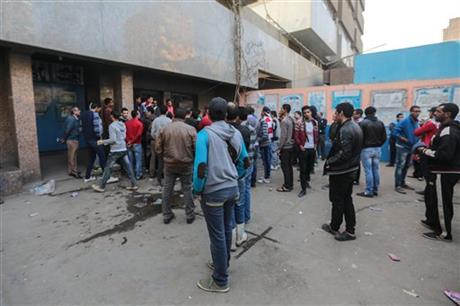
By SARAH EL DEEB
Egyptian police have arrested 21 soccer fans in the wake of a deadly stampede outside a Cairo stadium and are accusing them of attacking policemen, damaging police cars and terrorizing the public, a prosecutor said Tuesday.
The prosecutor, Mohammed Seif, told reporters that none of the 21 had been formally charged with anything yet.
Authorities say at least 19 people were killed Sunday night, when police fired tear gas into a crowd of fans waiting in a fenced, narrow corridor to try to enter the stadium in eastern Cairo. Many of the dead suffocated or were trampled in the melee. It was the deadliest act of soccer-related violence in Egypt since 2012.
Prosecutors said 22 died, but the government’s health ministry said 19 died. Among the dead was a 14-year-old girl. No police officers were killed, although a police vehicle was set on fire.
The disagreement over the death toll, which couldn’t be reconciled Tuesday, reflects the confused, bitter disputes between police and civilian accounts of what happened.
Government officials defended the police tactics, arguing that fans without tickets wanted to break into the stadium. Fan representatives rejected those accusations. Egypt’s soccer league suspended its games nationwide indefinitely following the violence.
Police repeatedly have been accused of using excessive force on crowds and protests — a focus for anti-government protesters ever since a popular uprising forced Egypt’s longtime leader Hosni Mubarak from power in 2011.
Sixteen human rights groups issued a joint statement Tuesday blaming police for the deaths. They accused officers of attacking the crowd in a “vengeful” manner. They said police must be held accountable for their role in violence, or they would be encouraged to commit more.
Police have increasingly used force against protests since 2013, when the army ousted Islamist President Mohammed Morsi from power. Security forces since have pursued anti-government activists, from both Islamist and secular factions, in an atmosphere intolerant of criticism.



